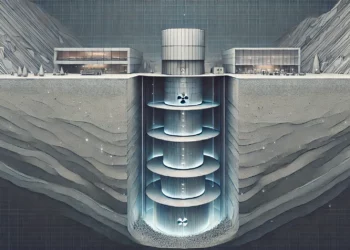The world is at an extremely dangerous crossroads: if we keep using non-renewable hydrocarbons and coal the way we have, we’ll be rising global temperatures to a point where the consequences are extremely dire, but in many parts of the world, renewable energy is simply not cheap enough, and people don’t want to pay for it. Faced with this conundrum, we may have an unexpected ally that could solve our problems: nuclear energy.

Sweden went from burning oil for energy to using nuclear, and if the entire world would follow their example, we could replace all fossil fuel plants with nuclear plants in 30 years, according to a new study published in PLoS One. All that’s missing is the people or companies to invest. Wait, but isn’t nuclear energy… bad?
The long answer is complicated, but the short answer is ‘no’ – in many ways, nuclear energy is although not renewable, way more sustainable than fossil fuels.
“If we are serious about tackling emissions and climate change, no climate-neutral source should be ignored,” argues Staffan Qvist, a physicist at Uppsala University, who led the effort to develop this nuclear plan. “The mantra ‘nuclear can’t be done quickly enough to tackle climate change’ is one of the most pervasive in the debate today and mostly just taken as true, while the data prove the exact opposite.”
Nuclear vs. fossil
In 2011, we wrote about an analysis which found that nuclear energy is 4000 times safer than coal plants in terms of emissions and health hazards. In the US alone, air pollution due to coal plants kill 30,000 people; in China, they kill 500,000. The problem with nuclear is that the problems it has are obvious, in your face, while coal is a deadly killer.

Benjamin K. Sovacool has reported that worldwide there have been 99 accidents at nuclear power plants. However, for the three worst nuclear accidents, less lives were claimed than coal does in a year! 60 people were killed directly at Chernobyl, and up to 25,000 fell from latent cancers. Estimates put the recent toll for Fukushima at 1000 lives, and the third largest nuclear accident, the Three Mile Island accident (1979) didn’t kill anyone. Of course, these are not small numbers, and you can’t just pass over them, but when faced with the alternative, the better option seems clear.
In terms of emissions, nuclear energy emits basically no CO2, nor does it pollute the atmosphere. Nuclear power can produce base-load power unlike many renewables which are intermittent energy sources lacking large-scale and cheap ways of storing energy. The challenge is the way in which the nuclear fuel is processed and ultimately stored; it’s not ideal, but no one is saying nuclear is the ultimate goal – but it could be a very good transition from fossil to renewable.
All in all, there are serious arguments to use nuclear instead of fossil fuels, but the public opinion is easily swayed by the more visible nuclear threats, although the fossil threats are often much bigger.
Transitioning to nuclear
Among the arguments used by opponents of nuclear energy is the fact that making the transition is difficult – but this study claims otherwise; and it’s not only Sweden that has a success story – France also enjoys transitioning to nuclear power. Nuclear energy, in the form of fission, is the primary source of energy in France. In 2004, fission energy made up the largest share of France’s energy consumption at 39%. In 2012, France was the biggest energy exporter in the European Union, they have cheaper energy than most European countries, but they also vowed to reduce their nuclear energy output. In 2015 France’s National Assembly voted, that by 2025 only 50% of energy will be produced by nuclear plants.
France switched to nuclear energy following a massive increase in the oil prices, and that crisis was much less considerable than what we are dealing with today. If countries like the US, China and India would follow in their trails, we would be seeing massive CO2 reductions and a great reduction in our impact on the climate.
“The state reacted to a crisis, at that time the oil prices, and implemented a plan, which quickly in 15 years had solved the problem,” Qvist says. “Analogies could be drawn to the crisis we have today: climate change.”
There lies the main issue which nuclear solves: it’s climate neutral, and to top it up, it’s reliable and quick to set up.
“No other carbon-neutral electricity source has been expanded anywhere near as fast as nuclear,” Qvist says.
The problem, however, remains the public image. As long as a few isolated events outshadow the fear of climate change, we won’t be building nuclear reactors anytime soon. But if we think about the bigger picture, then it seems like a good option.






